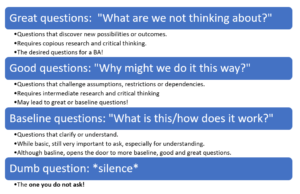
Is There Such A Thing as a “Dumb Question”?
“This may sound like a dumb question…but…,” insert question here.
What prompts us to preamble a question with such a statement? We tend to dwell on the fear that asking questions, even the simplest or for clarification can be the inception of negative thought and appearing uneducated to our peers. One of my colleagues when I first began the role of business analysis reassured me that there is “no such thing as a dumb question.” However, I write this piece to dissuade the notion.
Working with myriad stakeholders and colleagues, as business analysts, remaining consistently curious is a fundamental competency to our field. How must we satiate our endless curiosity? Ask questions! As part of the lexicon to being a business analyst, questions are the lifeblood to the capacity of the work we perform. Executing a swift Google search on “how many questions do we ask a day?” the quantitative results for adults are estimated to be averaged at twenty questions per day, whereas children are in the hundreds a day. Hundreds! Notwithstanding those children may have an ulterior agenda to ask numerous questions, whether it be to annoy their parents out of humor or they’re truly curious, the comparison of frequency in questions is staggering. Yet, we focus less on the quantitative nature and more on the qualitative aspects to feeding our inquisitive intellects.
If you refer to Exhibit 1 provided in this article, it pictorially represents my personal model of how one may categorize questions in four different quantifications. These are: great questions, good questions, baseline questions, and dumb questions.
Exhibit 1:

Great questions are the ones we ask to discover new possibilities or outcomes. The trademark piece to being a business analyst via elicitation. These ones may be framed in ways of detailed, technical questions but the objective remains to discover what may be unseen or overlooked. They also require an incredible amount of effort in terms of research and critical thinking. You may be surprised at the sheer volume of information that can be elicited from asking a great question versus some of the others. Great questions are the cornerstone questions for a business analyst.
Good questions are the step below the great questions. These are critical, nonetheless, but have an objective to challenge assumptions, restrictions, or dependencies within projects or the task at hand. These may require an intermediate level of research or critical thinking and forward consideration to come up with. These may be your “why” questions. Much like great questions, the voluminous amount of data by asking good questions can sow benefits to be reaped in business analysis. Good questions can be the framework between the baseline questions and great questions, where the details are in between the lines.
Baseline questions are as the name implies: intended to set the baseline. These are questions that can be asked for clarification or understanding. These are just as important as any of the others and contain significance in the realm of business analysis. Baseline questions give you that foundation that opens the realm to the categories to inquiring more questions. Rest assured, there is absolutely nothing incorrect about asking baseline questions. It may open the door to good or even great questions by asking the most basic baseline question.
The next time you find yourself in a position, as a business analyst, or elsewhere, determining if you should ask the question, follow these steps. First, remember the only dumb question is the one you do not ask. Two, ask the question! Do not let fear or negative emotion impede your learning as a business analyst and the potential to open doors that may have been left untouched. It is not something that can be learned overnight but over time. Even I, myself, am still working to ask questions in my role, baseline, good, or great, and mitigating the dumb question.
In case of emergency of not knowing…just ask!